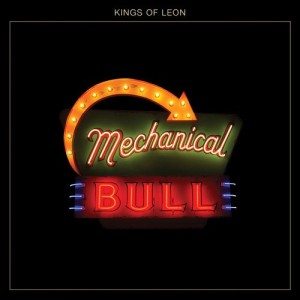Mechanical Bull
 Ever since the release of 2008’s Only by the Night, divisions have arisen within the Kings of Leon camp regarding which musical direction the band should continue to pursue. The expansive sound and undoubted stadium ambition of the band’s fourth album provided them with unprecedented levels of mainstream success on both sides of the Atlantic, yet it became increasingly apparent that not everyone within the group was happy with such success and its inevitable consequences.
Ever since the release of 2008’s Only by the Night, divisions have arisen within the Kings of Leon camp regarding which musical direction the band should continue to pursue. The expansive sound and undoubted stadium ambition of the band’s fourth album provided them with unprecedented levels of mainstream success on both sides of the Atlantic, yet it became increasingly apparent that not everyone within the group was happy with such success and its inevitable consequences.
Lead singer Caleb Followill went on record in a number of interviews (as well as numerous live performances) stating that he wasn’t entirely at ease with the new demographic of fans Only by the Night had attracted, and what he felt the band had lost in the process. Though many were quick to condemn the group for being so dissatisfied with such economically beneficial success, it is easy to understand the artistic quandary the Followills found themselves in when attempting to decide how they should move forward from such a pivotal record.
2011’s Come Around Sundown confirmed to the world that Kings of Leon were still stuck firmly within a state of collective indecision, with the album containing elements that harked back to the group’s earlier, grittier material, whilst also providing songs that reflected the stadium-packing prowess of their more recent efforts. In truth, such an artistically incoherent album aimed at placating both fan bases, yet it ended up satisfying neither, and critics accused the album of sounding overly cautious and lyrically simplistic.
Following a cancelled tour in 2011 amid rumours of health concerns and infighting within the band, many were justified in fearing for the future of a group that once possessed so much promise. However, following a lengthy period of rest and rehabilitation (in which all but one of the band’s members have become married and had children), the Kings of Leon announced their plans to release a sixth studio album entitled Mechanical Bull.
Leading up to its release, band members have displayed a unified front to the press, citing the positive effects of such a prolonged period of rest, and stating that Mechanical Bull reflected a group of musicians now far more comfortable in their own skins. Yet, despite conveying a sense of the team being in a far happier state of mind, this is an album which finds the band still in the midst of artistic indecision.
The Followills have rediscovered their love for creating music, but Mechanical Bull does suffer from a lack of artistic clarity, which has plagued the band for the last five years.
The opening three tracks of Mechanical Bull provide a real sense of momentum, grounded in fast-paced, guitar-led rock songs which most clearly echo the group’s early recordings. Lead single ‘Supersoaker’ is an infectious and upbeat summer rock song: relentless yet melodic, and boasting a set of wailing vocals which evoke the sounds of Aha Shake Heartbreak. The subsequent pair of ‘Rock City’ and ‘Don’t Matter’ showcase a gritty southern flair, with an intensity reminiscent of both The Stooges and the Kings’ own debut, Youth and Young Manhood. Caleb’s vocals are laden with an attitude which had seemingly gone awry on the band’s previous two records: in ‘Don’t Matter’, he declares “I can fuck and I can fight / it don’t matter to me”, whilst ‘Rock City’ begins with the lead singer stating “I was running through the desert, I was looking for drugs / I was searching for a woman who was ready to love.”
But in spite of such an enjoyably raucous opening salvo, the majority of Mechanical Bull is made up of melodic, mid-tempo tunes, which the band appear to be far more comfortable producing in bulk. ‘Beautiful War’ is an atmospheric ballad, originally written during the period of Only by the Night, and thus instantly evocative of the night-time allegiance of that record’s songs. Whilst pleasantly tuneful, with lyrics that reflect the impact fatherhood has had on the singer, this overlong ballad never fully develops into a satisfying crescendo, instead fading away just as quietly as it begins.
 But if ‘Beautiful War’ is an unsatisfying attempt at a melodic ballad, ‘Wait for Me’ is its antithesis. A rhythmic love song, with yearning group vocals, it provides one of the more satisfying slow moments on the album. ‘Temple’ is a well-polished cut, with a chorus evoking commercial American rock of the ’90s, and a bridge that Thin Lizzy fans may find familiar. Songs such as this and the funky ‘Family Tree’ reflect an album that feels far more light-hearted than any previous effort from Kings of Leon, and this also translates to the lyrics throughout the record, filled more with ironic jests than sardonic wit.
But if ‘Beautiful War’ is an unsatisfying attempt at a melodic ballad, ‘Wait for Me’ is its antithesis. A rhythmic love song, with yearning group vocals, it provides one of the more satisfying slow moments on the album. ‘Temple’ is a well-polished cut, with a chorus evoking commercial American rock of the ’90s, and a bridge that Thin Lizzy fans may find familiar. Songs such as this and the funky ‘Family Tree’ reflect an album that feels far more light-hearted than any previous effort from Kings of Leon, and this also translates to the lyrics throughout the record, filled more with ironic jests than sardonic wit.
The one exception to the overall melancholy of the latter half of the album is the song ‘Tonight’, in which Caleb sings with more urgency and intensity than at any other moment on the album. Declaring that “tonight / somebody’s lover is gonna pay for a sin”, it provides a brooding warning of the nocturnal antics of Broadway and Nashville. The urgency of its vocal take combined with an ‘Immortals’-esque chorus make it the most exciting song in Mechnical Bull’s armoury.
While Mechanical Bull displays the Followills having rediscovered their love for creating music, the record does suffer from a lack of artistic clarity that has now plagued the band for the last five years. There remains plenty to enjoy, with songs which are sure to please both new and old fans of the group, yet ultimately, the album stops short of being a truly great work, thanks to the Kings’ continued inability to decide exactly what it is they want to be.
Similar To: Thin Lizzy, The Stooges
MP3: ‘Tonight’, ‘Temple’, ‘Rock City’

Comments